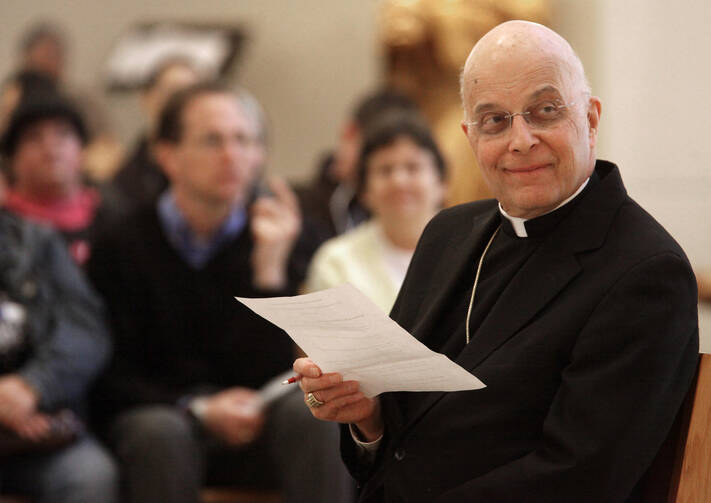To say that Cardinal Francis E. George was an intellectual would be an understatement. To try to quantify his impact on the Catholic Church in the United States and in the world would be an underestimation.
"He's the closest thing in recent American church history to what you would think of as sort of the all-star European cardinal intellectualist," veteran Vatican journalist John L. Allen Jr. told the Catholic New World, Chicago's archdiocesan newspaper, in December 2013. "Prior to George in Chicago, the American Catholic Church has never really produced such a thing."
Cardinal George, who retired in 2014 as Chicago's archbishop, died April 17 after a long battle with cancer. He was 78.
The late churchman's intellectualism was sharpened during stints teaching philosophy at several Catholic universities across the nation, and then further honed when writing doctoral dissertations in philosophy and theology.
"He is acutely aware that words carry meaning. They shape ideas, and ideas shape actions," Father Thomas Baima, vicar for ecumenical and interreligious affairs for the Archdiocese of Chicago and vice rector for Mundelein Seminary, said during an October 2013 speech on Cardinal George.
Probably the most famous words spoken by Cardinal George came during a talk before a group of priests, in which he warned about the dangers of a completely secularized society. The comment went viral, leading Cardinal George to write about it in an Oct. 21, 2012, column for the Catholic New World.
"I am (correctly) quoted as saying that I expected to die in bed, my successor will die in prison and his successor will die a martyr in the public square. What is omitted from the reports is a final phrase I added about the bishop who follows a possibly martyred bishop: 'His successor will pick up the shards of a ruined society and slowly help rebuild civilization, as the church has done so often in human history.'
"What I said is not 'prophetic' but a way to force people to think outside of the usual categories that limit and sometimes poison both private and public discourse."
However, papal biographer and columnist George Weigel believes Cardinal George's writings and speeches sounded a warning bell early on, especially on threats to religious freedom.
"His calm insistence that there were and are deep cultural problems in American democracy was a needed wake-up call for many," Weigel wrote in a December 2013 email to the Catholic New World.
A blatant example is the 2011 federal Health and Human Services mandate requiring nearly all employers to offer coverage of abortion-inducing drugs, sterilizations and contraceptives. The exemption for religious employers is so narrow that most religiously affiliated organizations -- such as Catholic Charities or Catholic hospitals and universities -- do not qualify.
Nonexempt religious employers can opt out of providing the coverage using what the administration calls a "work around" by notifying the government of their objections to the coverage then the government tells insurers they must cover the services. But what religious employers still find this objectionable.
The contraceptive mandate is part of the Affordable Care Act, which became law in early 2010.
In a 2009 address as president of the U.S. Conference of Catholic Bishops, Cardinal George reiterated the bishops' long-standing support for making "health care more affordable for low-income people and the uninsured. We remain deeply concerned that immigrants be treated fairly and not lose health care coverage that they now have."
But he also said the bishops would continue "to insist that health care reform legislation must protect conscience rights." Health care professionals and institutions "should know that their deeply held religious or moral convictions will be respected as they exercise their right to serve patients in need."
In a November 2012 YouTube video posted by the Archdiocese of Chicago, Cardinal George said: "The church is her ministries as well as her worship, and the government has told us, 'No, you're not. You're just your worship.'"
His American peers looked to his intellect and leadership, electing him to a three-year term as USCCB president in November 2007. Just this January, the Knights of Columbus presented Cardinal George with the organization's highest honor, the Gaudium et Spes award.
That respect extended to the Vatican itself, which valued his global view shaped by his work as head of the Missionary Oblates of Mary Immaculate for 12 years, said Allen.
He was not without his critics, however. Father Robert Barron, founder of Word on Fire Catholic Ministries and rector of Mundelein Seminary, noted in a talk about Cardinal George delivered to the seminary on the 50th anniversary of his priesthood that both "liberals" and "conservatives" often felt stung by Cardinal George's words, when he was merely calling for life true to the Gospels.
"What he proposes, finally, is neither liberal nor conservative Catholicism, but 'simply Catholicism,' which means the faith in its fullness, mediated through the successors of the Apostles," Barron said.
For all of his accomplishments, however, Cardinal George remained unassuming. Law professor, pro-life advocate and author Helen Alvare recalled meeting him when he was bishop of Yakima, Washington, and was surprised at his small apartment and humble furnishings.
"The other thing I noticed about his living quarters was there were more books than anything else," she told the Catholic New World in December 2013.
That lifelong intellectual pursuit will shape "the George legacy," Allen said.
"What we'll mean by that is the recovery of a kind of sixth sense of what it means to be Catholic," he said.








